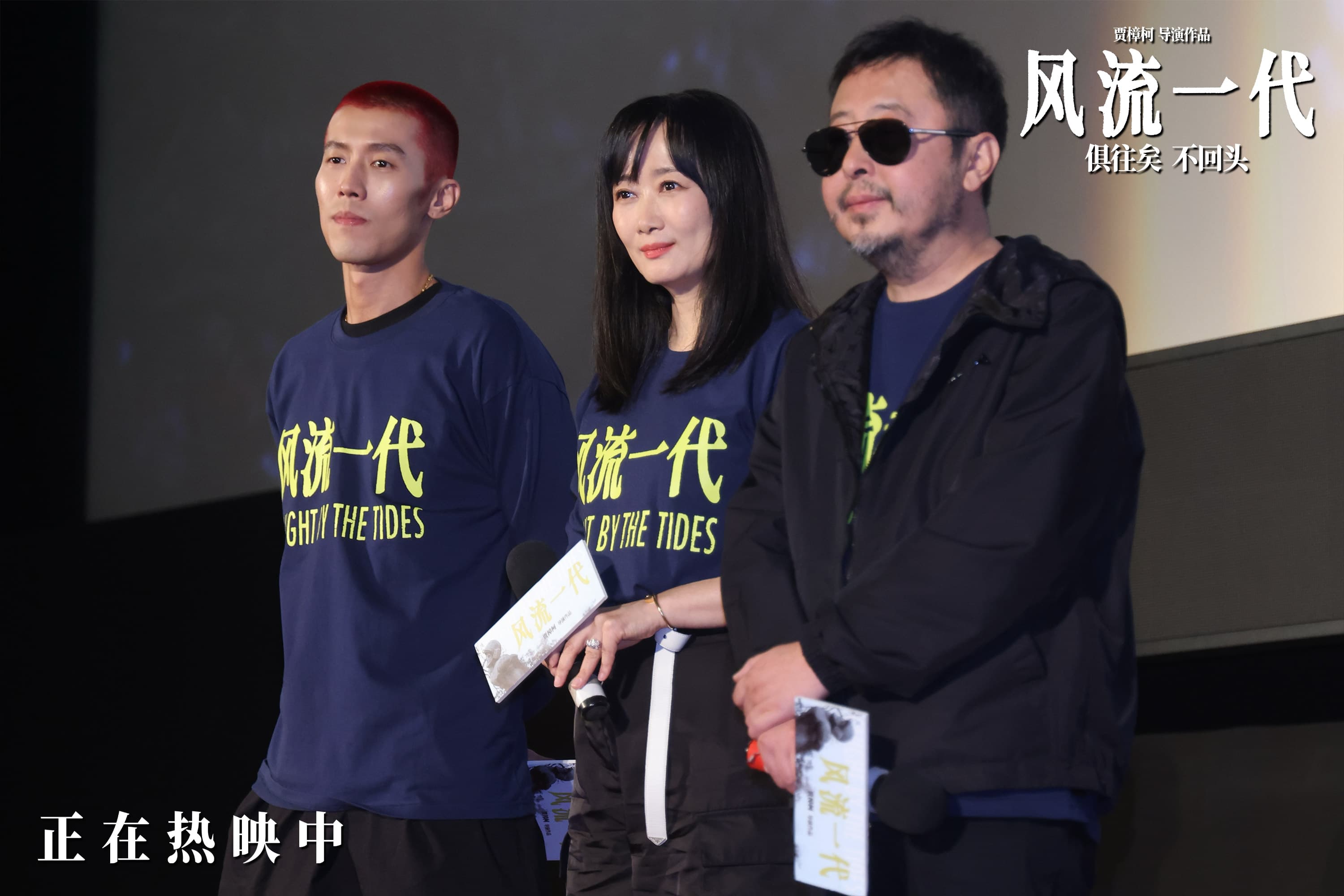
On November 22, directed by Jia Zhangke and starring Zhao Tao and Li Zhubin, the film "A Generation of Promiscuity" officially premiered nationwide. The film continues the narrative of Qiao Qiao and Brother Bin within the "Jia Zhangke Universe," exploring the characters' fates as they ebb and flow with the times in yet another parallel universe.
"A Generation of Promiscuity" is a labor of love produced by Jia Zhangke's team, which began filming in 2001 and took 22 years to complete. The film presents various visual mediums from different periods, showcasing the different qualities and formats of images as well as capturing the societal snapshots and lifestyles from various times since the 21st century.
On the day of the premiere, following a screening at the Shanghai Daguangming Cinema, Jia Zhangke, along with lead actors Zhao Tao and Zhou You, shared insights from this 22-year journey of filmmaking.

Zhou You, Zhao Tao, Jia Zhangke
Jia Zhangke, who has always maintained a keen interest in visual media, was among the first filmmakers of his generation to adopt DV cameras. In this era of digital and film transitions, he embraced novelty and experimentation, deciding to use digital DV to document daily life and corresponding cinematic materials. Initially, he intended to pay homage to the classic documentary "Man with a Movie Camera" directed by Dziga Vertov, naming his experimental work "Man with a Digital Camera." Beginning his filming at the turn of the millennium, everything was vibrant and full of life.
"I have always been fascinated by early films in cinema history where filmmakers took cameras directly into life to capture reality. However, as the film industry matured, scripts have often predetermined character relationships and story directions. This exploratory filming, akin to a journey, creates a sense of discovery, just as one would not know whom or what one might encounter on a trip." After intermittently filming for two to three years, Jia Zhangke found himself feeling that the film "should come to an end" but also believed there was "no reason for closure." It seemed that life, including societal transformations, was just beginning, leading him to film intermittently for 20 years. During this time, he worked on several other projects, gradually forgetting about this earlier creation.
"It wasn't until the pandemic that I suddenly felt as if an era was indeed coming to an end, and that this film should also conclude." Jia Zhangke revisited the footage to edit it anew, stating, "I felt that this film shouldn’t just dwell in the past; it should be viewed from a broader perspective, reflecting on how we have gradually transitioned from the vibrant and tolerant society of the millennium—a place bustling with possibility and human connection—to today; and how we've stepped from the internet society into the age of artificial intelligence. Therefore, I shot additional contemporary segments."

Jia Zhangke
Jia Zhangke explained that the film employs various "cross-era devices," ranging from film to the latest VR technology, blending these different formats to create a shared memory of the times for both creators and audiences. "The mix of so many images is akin to mixed media in contemporary art, where, between materials, the transitions of an era and its emotions can be perceived."
In this new universe, Zhao Tao plays Qiao Qiao, a weigh clerk in a supermarket. Regarding this character setting, Jia Zhangke remarked, "I have always been particularly interested in the supermarket environment. When we were children, we experienced extreme material scarcity, but in contemporary supermarkets, we find such abundance. It seems to conceal everything, making us believe we are living in an era rich in material goods, while in reality, it also obscures the struggles of individuals, the disparity between the wealthy and the poor."
Qiao Qiao in the film is a silent character who does not speak. On this design choice, Jia Zhangke indicated that during filming, “there were many dialogues over the years, but in editing, I felt that excessive emotional expression would weaken our complex feelings accumulated over decades, narrowing our view. So gradually, the lines were reduced until finally, she stopped speaking entirely." Jia Zhangke aims to convey to the audience that, "In the feelings of an era, if we articulate just a little, we lose the remaining 99 points. If the female protagonist remains silent, it seems that the nuanced feelings are preserved at a hundred percent."

Event Scene
After the screening, guest viewing participant and president of the Shanghai Film Association, director Zheng Dasheng, also expressed his deep reflections on the film. "Over the years, I have often seen the characters crafted by Director Jia, traversing various epochs in his films. In this piece, we once again journey through such vivid, tangible eras. Looking back now, there are so many dramatically touching moments, as we reflect on the journey almost a quarter-century later. Some have become stranded, while others continue to run ahead. We also look forward to seeing him and her in Jia Zhangke's cinematic universe, traversing through time and eras."
It is worth mentioning that this is a film with a limited release of 22 days. When the premiere date was announced, Jia Zhangke stated that for spectators eager to see "A Generation of Promiscuity," the 22 days would be "sufficient for a reunion." He also shared on Weibo, "This film took 22 years to create, and we use 22 days to bid farewell to those 22 years. I want us to utilize these 22 days in the most ceremonial manner to honor the over 20 years of the century that has 'passed,' and to bid farewell to the past of 'A Generation of Promiscuity.'"

Creators with Audience


